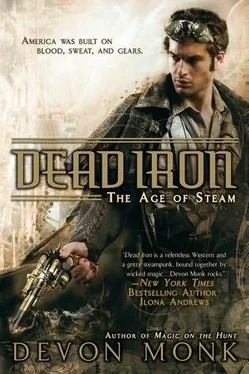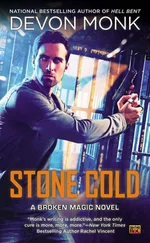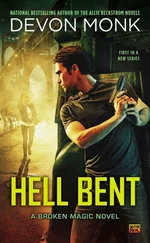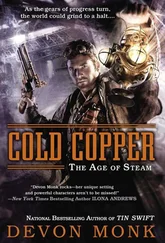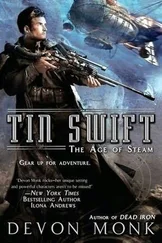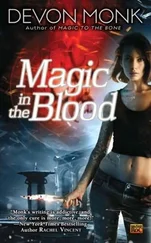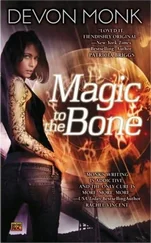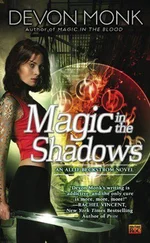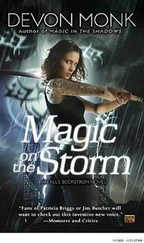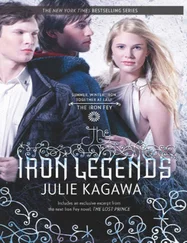LeFel never tired of it.
This time was different. Disturbingly so. The man clenched his jaw and fist, pulling his heavy shoulders back as if accepting a weight. He turned a smoldering glare on LeFel.
“Let the boy go.”
“You think you can issue me orders?” LeFel threw the hourglass into the air.
Wil’s eyes widened, then narrowed, his body instinctively bunching and reaching to catch the fragile clockwork glass.
“No!” Wil pushed against his shackles, arms snapping chains to their length, far short of reaching LeFel or the hourglass.
LeFel snatched the hourglass out of the air and smiled at Wil’s fear, his anger, his desperation. “Never forget, cur,” LeFel said through bared teeth. “I am your master. If you speak to me in such a manner again, I will kill that boy and feed him to you.”
The French door clacked open and Mr. Shunt filled the gap. He tapped one needle-pointed nail against the silver tray he carried, announcing his presence, then ducked the doorway.
“Lord LeFel?” he murmured.
LeFel placed the hourglass on the arm of the chair, where it tipped precariously to one side. A tremble, a breath, and it would fall to the floor again.
Wil Hunt leaned his head against the wall, staring at the hourglass as if his gaze alone could hold it steady.
The shackle at his neck shifted, biting against his collarbone, but he did not shrug away from the pain, did not say any more, did not glance at the boy.
Much better.
Mr. Shunt glided into the room, looking neither left nor right at the man or boy. His overly long, strangely jointed fingers wrapped thumb and forefinger over the edges of the tray, the rest of his fingers splayed like skeletal wings. His eyes glowed yellow beneath the brim of his stovepipe hat, though the rest of his features were lost in the lacy shadows and scarves piled high around his neck.
LeFel glanced at the tray the Strange carried. “That will do. Feed them.”
“Yes, lord.” Mr. Shunt smiled, his teeth a row of points beneath the shadow of hat and scarves.
He moved to stand next to the man, offering him a tin cup that sloshed with water. Wil took the cup and waited. Mr. Shunt pulled a fistful of bread that smelled of oats and rye from the pocket of his coat and offered it on a flat hand like a treat to an animal. Wil took the bread without comment or question but did not eat or drink.
Mr. Shunt glanced back at LeFel, who nodded once.
Mr. Shunt pivoted toward the boy, his approach slower, more careful, as if he were stalking skittish prey. He shifted so he did not stand in Mr. LeFel’s line of sight to him, then held a wooden bowl of cooked oats with a spoon stuck inside it out to the child.
The boy did not look away from LeFel, but his breathing hitched up faster the closer Mr. Shunt folded down nearer his side.
“Eat,” LeFel cooed. “I am sure you are hungry.”
But the boy did not move, not even to blink his eyes. The buttery aroma of oats filled the air, soured just slightly by the drugs that laced the meal.
“If you eat, I will let you go home,” LeFel murmured.
“He lies,” Wil Hunt whispered. “Ain’t nothing to him but lies.”
LeFel chuckled. “No. This man doesn’t understand. You would have fallen from your window that night. We caught you, Mr. Shunt and I, and brought you here safe with us. And we’ll be taking you home today. After you eat your food.”
The boy pressed his lips together, his cheeks coal red against his pale face.
“Don’t eat it,” Wil whispered.
LeFel clucked his tongue. “Now, now. Every growing boy needs to eat. You do want to grow up to be big and strong like your papa, don’t you?”
And those words, the mention of his father, finally broke the boy’s thrall. A single tear ran down his cheek. He shifted his eyes, meeting, finally, LeFel’s gaze. The boy nodded once.
“Good, then, good,” LeFel said. “Mr. Shunt, help the boy eat.”
“No,” Wil said. “It’s poison, boy. Don’t eat it.”
But Mr. Shunt had already scooped up a spoonful of the mush and shoveled it into the boy’s mouth, like a bird stuffing a chick. The boy chewed, swallowed, and opened his mouth again.
Wil Hunt shifted, his heavy chains clanking. “Leave the boy alone. Do what you want to me—I’ll take on whatever debt that child owes to you. Let him go, or so help me, I will tear out your throat.”
LeFel rolled his head against the back of the chair. “You, cur, are less than a gnat to me. And a bothersome gnat at that. I tire of you.” He picked up the hourglass and dropped it on the floor at his feet. He lifted his foot and smashed the hourglass with the heel of his boot.
Wil Hunt yelled out, in pain, in rage.
LeFel watched as he twisted, stretched, molded back into the form of an animal, a mindless beast. He lay there, whimpering in pain.
LeFel turned his heel upon the glass and gears, assuring it was crushed to dust.
“You are no matter to me now. Mr. Shunt,” he said. “I believe it is time to invite the witch to join us. Bring her to me.”
“Alive?” Mr. Shunt breathed, the empty spoon balanced in the air by just his thumb and pointer finger, the rest of his fingers flared out.
“Yes,” LeFel said, “alive. For now.”
Mr. Shunt scooped one last mound of oats into the boy’s mouth. He tipped his fingers to the brim of his hat, and then ducked back through the doorway, dissolving into the darkness.
LeFel closed his eyes, letting the sound of the wolf’s pain and the boy’s quiet sobbing fill him as no other nourishment could.
The crash and thrum of the steam matics outside the carriage was interrupted by a knocking at the door. He walked to the window, wondering who among his workers would dare bother him without invitation. He pushed aside the brocade curtains and squinted against the afternoon light.
There, on the steps of the carriage, was a small matic. Its portly copper body was balanced on spindly spider legs covered in dirt and dew and pine needles. The dual springs on the top of the device pumped puffs of steam out the side vents. It had been running all night, the fire within it nearly gone.
“No.”
LeFel opened the door, and the little matic rattled in, coming to a rest at his feet, its spindly legs tucked beneath it.
Using his handkerchief, LeFel lifted the matic to study the alarm trip.
This was clearly the ticker he had left at Jeb Lindson’s graveside. And it was also very clear that Jeb Lindson was no longer dead.
LeFel yelled, his fury cursed in a language that could blister the sun. He hurled the ticker at the wall, shattering it like a glass bell, pieces bursting apart on the floor, the embers that once drove it gone to ash beneath the heat of his words.
The wolf pushed onto its feet, head low, ears back, teeth bared. The boy, fallen once again under the effects of the drugs, did not stir.
“You will not stand in my way, dead man,” LeFel said. “Not between me and the witch’s powers. If death will not take you, I will tear you apart myself.”
LeFel took up his curved cane and strode across the broken bits of metal to the boy. It was time he be of use. It was time to introduce the boy to the creatures LeFel kept locked away in the adjoining carriage.
LeFel paused above the cot the boy lay upon, then bent close to his ear. “Come, little dreamer,” he whispered. “Time to bleed.”
Cedar Hunt gauged just how quickly he could draw his own gun against Cadoc Madder, and judged it to be a losing proposition.
“Have a seat, Mr. Hunt,” Cadoc said again.
“I’ll stand, if it’s just the same,” Cedar said.
Cadoc pointedly looked down at the table where the arrow Cedar had touched still glowed faintly, then back up at Cedar. “Stones say you’re hunting,” he said, slow, as if each word were sorted out from among too many others.
Читать дальше
